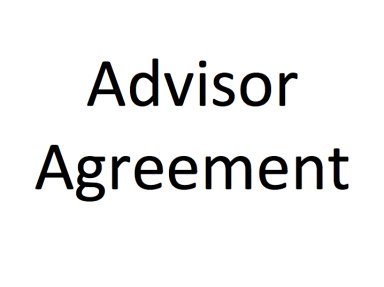
Publication number: ELQ-64499-1
View all versions & Certificate

How to Know What to Address in an Advisor's Agreement for Early Stage Startups
Step by step methodology composing the essential components to create an Advisors Agreement for early stage startups
Introduction
Often people have the product idea and framework to build up a company but they aren’t sure about how they ought to proceed. For certain aspects they seek the advice of experts. The founders may bring in a veteran entrepreneur or some other expert to guide them. However, they often get stuck when the question arises about how much equity they should offer to the advisors. The Advisor’s agreement addresses the details about the equity to be offered to the advisors along with the roles they will be expected to play and the rights they will have vis-à-vis the company/ business. All other details regarding the advisor’s work with the company must be dealt with within such an agreement
ESSENTIAL ELEMENTS OF AN ADVISOR’S AGREEMENT
For an advisor’s agreement to efficiently fulfil its purpose it must contain the following elements:
- Step n°1 |
Services
Advisor’s agree to act as advisors or mentors for the company and extend advice and assistance on matters which have been described within the agreement or have been mutually agreed upon by the parties. Advisors usually provide advice, investment, introductions and social proof. The services expected out of an advisor must be discussed thoroughly and mentioned within the agreement. At the same time certain room must be left within the agreement so that if the work to be done by the advisor is to be expanded, there would be enough flexibility to do so.
Some companies even set up a board of advisors. However, a board of advisors, unlike a board of directors isn’t a legal/ statutory body. Setting up a board for the advisors isn’t necessary and entirely optional. It is done in order to increase social proof and credibility of the startup and this need not necessarily be mentioned in the advisors agreement. - Step n°2 |
Compensation
An advisor may or may not be entitled to cash compensation. However, advisors are often (though not necessarily) given a small percentage of equity (or number of shares) as compensation which must be indicated in the agreement. The usual method is for companies to seek written approval or have a meeting of the Board of Directors to authorize the compensation that an advisor will receive. The advisor has to buy these shares at face value as opposed to the premium rate fixed according to valuation that investors or other buyers pay (as required under Indian company law, every shareholder must buy any shares at the minimum price of face value).
The equity an advisor receives is mostly determined on the basis of the category in which he falls. Advisors are divided into two categories on the basis of their level of expertise and work. These categories are as follows (most numbers are silicon valley standards though in India advisors often demand a lot more):
- Standard advisor- In practise these are the advisors who usually do one important act for the company and nothing beyond that. Even if their acts are multiple, their basic work for the company is of a limited nature, even if it is important. A standard advisor may come for monthly or weekly meetings. These advisors receive about 0.1%-0.25% of the company’s post series stock. The stage where the company is still ideating the compensation received by a standard advisor is usually up to 0.25%. In the start-up stage of the company they receive close to 0.15% of the company’s stock and in the growth stage it is decreased to 0.10%.
- Strategic advisor- A strategic advisor is one who aids the founders of the company with strategic matters like positioning of products or business, connecting with corporate buyers for big orders, recruitment of the top level company personnel or introduction to investors. Their involvement is greater than standard advisors. They meet the founders on a regular basis. Their compensation moves from 0.50% in the idea stage, to 0.40% in the start-up stage and then comes down to 0.30% b the growth stage.
- Expert advisor- The expert advisors are veteran entrepreneurs. An expert advisor has a great level of involvement with the company. They know the company’s prospective clients intimately and may even help in raising money for the money for the company. An expert advisor can introduce the founders to key clients. In some cases he may even help in acquiring certain projects. An expert advisor’s compensation starts at 1.00% in the idea stage then it comes down to 0.80% in the start-up stage and falls down further to 0.60% in the growth stage.
Whatever amount a company may choose to give to an advisor of any category during any stage must be specified within the advisor’s agreement so as to prevent conflicts in the future. While this amount may vary with the circumstances in which the company is functioning, it is certainly important to lay down a basic understanding.
Many startups prefer to give equity to advisors and mentors in a drip system, where a few shares are handed over for every month of involvement. This way, if the advisor is no adding value, the agreement can be terminated and no more shares have to be issued to the advisor after that.
add_shopping_cartContinue reading for free (70% left)

